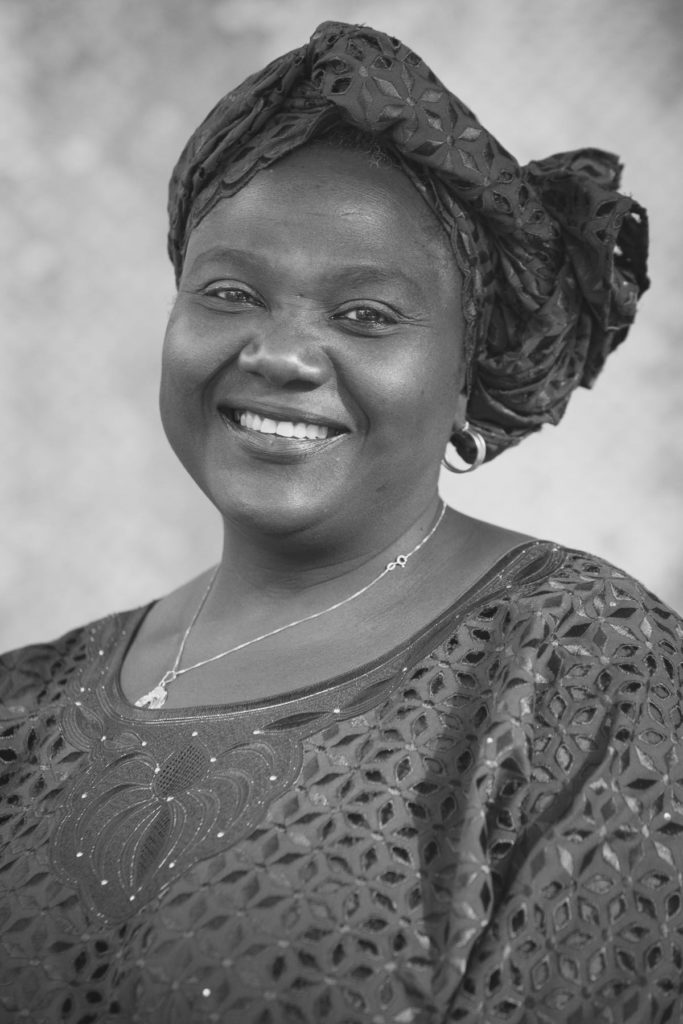Rocky Dione
Rokhaya Dione has been a CMW parent since 2010. Her daughter Marieme plays violin and son Djibril plays viola. “Everybody calls me Rocky,” she says. Everyone also knows that she is quick to pitch in. “I cannot just take and not give back,” she says. “What other way would I have to say thank you than to help?” Rocky is a music lover, and was introduced to flute, piano, singing and a bit of theory as a child in Senegal. She was an enthusiastic member of a CMW parents choir that met two years ago. She still likes to sing “Coffee Beans,” a challenging round by American composer and New York City street musician Moondog.
I always liked music. I was born and raised in Senegal. I went to a school where music was part of the curriculum and I was very good at music, and my teachers pushed me and encouraged me. I was very good at theory. I played flute, I played a little bit of piano, and we had a choir, so we were doing some singing, too.
I wanted to do music at the end of my schooling, but my mother said, “No! I don’t want artists in my house because their life is too free. They do whatever they want.” She forbade me to go to a music school and that was it.
My mother used to listen to Bach and all those French composers. We had lots of records in the house, but she just wasn’t comfortable with the way of life of musicians. I still have my flute, so I still play little songs, what I remember from middle school. Other than that, it’s just listening to music. And I sing to myself. I sing in the car, I sing in my shower. [Laughs]
In Senegal, we speak French. We also speak a dialect called Wolof. And now I speak English more fluently than before. Everybody has to learn English in school in Senegal, but we don’t really speak it. It’s only when I get here that I was forced to actually speak it daily. I was 34 turning 35 when I came here.
It was hard. The language barrier was phenomenal. And to start, I worked any jobs. I worked with a temp agency. I went from putting jewelry in boxes to factory work to–I did anything. And a year later, when I was getting a little bit more comfortable with English, I went to CNA training at a nursing home and I got my certification and I did CNA work for five years. Then I saw an ad from the company I’m working for now, Shell, and I applied for it. I manage a Shell store in Warwick now.
Marieme and Djibril went to William D’Abate (Elementary School). I was talking to a teacher and saying that I would like my daughter to learn an instrument because I thought it was important for kids to do some music. I was complaining about the fact that lessons are expensive and she’s like, “Oh, you know what? You should go to Community MusicWorks.” I remember going up and down Westminster Street several times and I couldn’t find the building. I was like, “What the heck?” Then I saw a flyer at school. It took us two years to get in the program. The year that CMW came to William D’Abate Marieme got in the program. She was in third grade.
Marieme likes playing violin. With Djibril, I have to push him, “Let’s go, let’s go!” I read a study that kids who play an instrument have more abilities in math because it develops that part of the brain where they have better thinking. So I say to Djibril, “You know, it helps you too. It helps you in math.” He’s, “Oh, mommy, I’m already good in math.” [Laughs]
In the beginning, it was just about the music lessons.When I first joined I didn’t know what Community MusicWorks was. What did they do? I mean, I signed up, I came to the interview, met Jesse [Holstein, resident musician], and I signed some papers, paid $10, and that’s it. I didn’t even know that I was supposed to bring her to lessons. I thought that the teacher would come home and give her the lesson. And then throughout the year I started seeing the activities and it’s great.
The time CMW takes is the hardest part. I’m always running. It’s not the only program Marieme and Djibril do. They play basketball and they sometimes play baseball when it’s baseball season, football when it’s football season. So I feel like I’m always driving around, taking them, picking them up, and with the job it’s not easy. We live in a time where having a job is a blessing. So you don’t want to be missing hours or working less than what you should be working and then get in trouble and get fired.
Sometimes just making it on time or participating is a challenge. Sometimes the choice is so difficult it’s like, okay, either the kids don’t go or I’m going to miss work. So how do I make it up? So it’s really…it’s my biggest challenge. The teachers are very understanding, and at the beginning of the year when we schedule when the lessons are going to happen, I always say, “Hey, I cannot make it until this time.” I’m going from Warwick to Providence to get them and come to the lesson. I need at least one hour to make it on time. It’s not easy, but the teachers really try to help make the schedule work.
I volunteer at CMW because I cannot just take and not give back. If I had to pay for a lesson, for not even two but only one kid, I would spend a lot of money. It would be very hard for me. Now, this group of musicians is helping me get my kids educated in music and all I have to pay is $10 a year. What other way would I have to say thank you than to help? Because they are helping me, so if they need my help I should be there for them. And that’s how I see life. Life is not only take. No. You have to give back.
I do think CMW achieves its mission. Watching my daughter from when she was in third grade to now, I see a young woman who is outspoken and fun and is confident about herself. Djibril is goofy, but he’s still doing it [laughs}. He gets something from it. As for the community part, I mean, when I see you at the mall, I say, “Hi, Linda!” and stop. We’ll talk, you know? But I can’t say the same about my neighbors.
I always said and I will always say it, I think Community MusicWorks is great and brings a sense of community, which unfortunately in northern countries like U.S .and even Europe, France, they don’t communicate. They don’t mix with other people. Everybody’s looking at each other. It’s the enemy next to you.
So I think that CMW is great. There should be more things like this throughout the country everywhere so that people know that whatever you are, rich, poor, you’re just a human being and you won’t be nothing more and nothing less. That sense of community, of no matter who you are you can be there, that’s what I think is important.
It would be even better if what happens at CMW could happen in the neighborhood, that people get to know each other. We say in my religion, which is Muslim, “That’s your closest parent, your neighbor,” because if anything happens to you before the police comes or the fire department comes, your neighbor will be the first one at your door. So how can we know each other if we are this close, living close, but not even speaking? I don’t know.
Once, I had neighbors next door and we used to go to each other’s house. But I lived in that street in 2004 and except for that one neighbor, nobody comes to my house, I don’t go to nobody’s house, really. Like the strangers that we are, we don’t try to know each other.
I wish that that CMW ambience was more global, like people anywhere, everywhere, and especially people living close together would make a connection, because at Community MusicWorks that connection is there even if it is sporadic, even if we don’t see each other all of the time. I would like Community MusicWorks to keep spreading so that more people join in and more bonds will be created. That’ll be awesome.
Back to the 20 Stories homepage.


